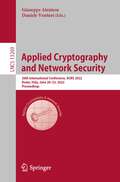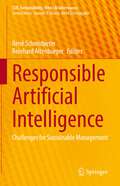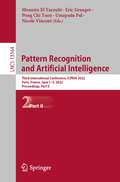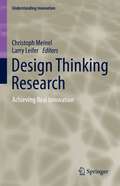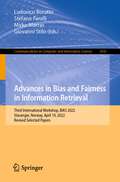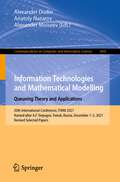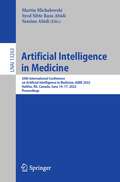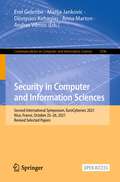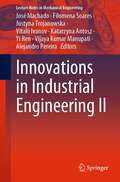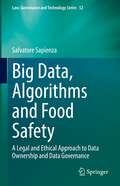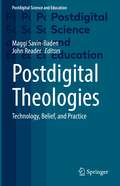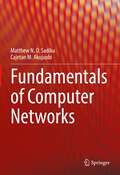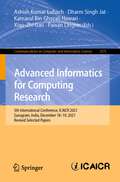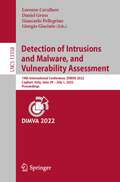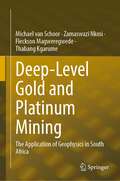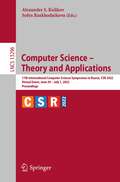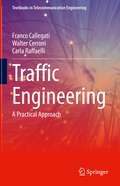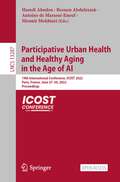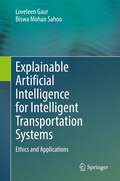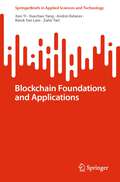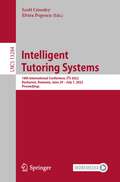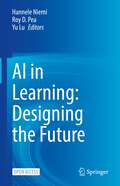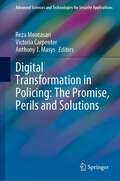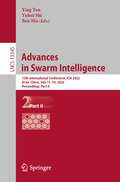- Table View
- List View
Applied Cryptography and Network Security: 20th International Conference, ACNS 2022, Rome, Italy, June 20–23, 2022, Proceedings (Lecture Notes in Computer Science #13269)
by Giuseppe Ateniese Daniele VenturiThe LNCS volume 13269 constitutes the proceedings of the 20th International Conference on Applied Cryptography and Network Security, ACNS 2022, which will take place in a hybrid mode in Rome, Italy in June 2022. The 44 full papers together with 5 short papers presented in this proceeding were carefully reviewed and selected from a total of 174 submissions. They were organized in topical sections as follows: Encryption, Attacks, Cryptographic Protocols, System Security., Cryptographic Primitives, MPC, Blockchain, Block-Cyphers, and Post-Quantum Cryptography.
Responsible Artificial Intelligence: Challenges for Sustainable Management (CSR, Sustainability, Ethics & Governance)
by René Schmidpeter Reinhard AltenburgerArtificial intelligence - and social responsibility. Two topics that are at the top of the business agenda. This book discusses in theory and practice how both topics influence each other. In addition to impulses from the current often controversial scientific discussion, it presents case studies from companies dealing with the specific challenges of artificial intelligence.Particular emphasis is placed on the opportunities that artificial intelligence (AI) offers for companies from different industries. The book shows how dealing with the tension between AI and challenges caused by new corporate social responsibility creates strategic opportunities and also innovation opportunities. It highlights the active involvement of stakeholders in the design process, which is meant to build trust among customers and the public and thus contributes to the innovation and acceptance of artificial intelligence.The book is aimed at researchers and practitioners in the fields of corporate social responsibility as well as artificial intelligence and digitalization. The chapter "Exploring AI with purpose" is available open access under a Creative Commons Attribution 4.0 International License via link.springer.com.
Pattern Recognition and Artificial Intelligence: Third International Conference, ICPRAI 2022, Paris, France, June 1–3, 2022, Proceedings, Part II (Lecture Notes in Computer Science #13364)
by Mounîm El Yacoubi Eric Granger Pong Chi Yuen Umapada Pal Nicole VincentThis two-volume set constitutes the proceedings of the Third International Conference on Pattern Recognition and Artificial Intelligence, ICPRAI 2022, which took place in Paris, France, in June 2022. The 98 full papers presented were carefully reviewed and selected from 192 submissions. The papers present new advances in the field of pattern recognition and artificial intelligence. They are organized in topical sections as follows: pattern recognition; computer vision; artificial intelligence; big data.
Design Thinking Research: Achieving Real Innovation (Understanding Innovation)
by Christoph Meinel Larry LeiferExtensive research conducted by the Hasso Plattner Design Thinking Research Program at Stanford University in Palo Alto, California, USA, and the Hasso Plattner Institute in Potsdam, Germany, has yielded valuable insights on why and how design thinking works. The participating researchers have identified metrics, developed models, and conducted studies, which are featured in this book, and in the previous volumes of this series. This volume provides readers with tools to bridge the gap between research and practice in design thinking with varied real world examples. Several different approaches to design thinking are presented in this volume. Acquired frameworks are leveraged to understand design thinking team dynamics. The contributing authors lead the reader through new approaches and application fields and show that design thinking can tap the potential of digital technologies in a human-centered way. It also presents new ideas in neurodesign from Stanford University and the Hasso Plattner Institute in Potsdam, inviting the reader to consider newly developed methods and how these insights can be applied to different domains. Design thinking can be learned. It has a methodology that can be observed across multiple settings and accordingly, the reader can adopt new frameworks to modify and update existing practice. The research outcomes compiled in this book are intended to inform and provide inspiration for all those seeking to drive innovation – be they experienced design thinkers or newcomers.
Advances in Bias and Fairness in Information Retrieval: Third International Workshop, BIAS 2022, Stavanger, Norway, April 10, 2022, Revised Selected Papers (Communications in Computer and Information Science #1610)
by Ludovico Boratto Stefano Faralli Mirko Marras Giovanni StiloThis book constitutes refereed proceedings of the Third International Workshop on Algorithmic Bias in Search and Recommendation, BIAS 2022, held in April, 2022. The 9 full papers and 4 short papers were carefully reviewed and selected from 34 submissions. The papers cover topics that go from search and recommendation in online dating, education, and social media, over the impact of gender bias in word embeddings, to tools that allow to explore bias and fairnesson the Web.
Information Technologies and Mathematical Modelling. Queueing Theory and Applications: 20th International Conference, ITMM 2021, Named after A.F. Terpugov, Tomsk, Russia, December 1–5, 2021, Revised Selected Papers (Communications in Computer and Information Science #1605)
by Alexander Dudin Anatoly Nazarov Alexander MoiseevThis book constitutes revised selected papers of the 20th International Conference on Information Technologies and Mathematical Modelling, ITMM 2021, named after A.F. Terpugov, held in Tomsk, Russia, in December 2021. Due to the COVID-19 pandemic the conference was held in a virtual mode. The 28 full papers presented in this volume were carefully reviewed and selected from 89 submissions. The conference covers various aspects of information technologies, focusing on queueing theory, stochastic processes, Markov processes, renewal theory, network performance equation and network protocols.
Artificial Intelligence in Medicine: 20th International Conference on Artificial Intelligence in Medicine, AIME 2022, Halifax, NS, Canada, June 14–17, 2022, Proceedings (Lecture Notes in Computer Science #13263)
by Martin Michalowski Syed Sibte Raza Abidi Samina AbidiThis book constitutes the refereed proceedings of the 20th International Conference on Artificial Intelligence in Medicine, AIME 2022, held in Halifax, NS, Canada, in June 2022. The 39 full papers presented together with 7 short papers were selected from 113 submissions. The papers are grouped in topical sections on knowledge-based system; machine learning; medical image processing; predictive modeling; natural language processing.
Security in Computer and Information Sciences: Second International Symposium, EuroCybersec 2021, Nice, France, October 25–26, 2021, Revised Selected Papers (Communications in Computer and Information Science #1596)
by Erol Gelenbe Marija Jankovic Dionysios Kehagias Anna Marton Andras VilmosThis open access book constitutes the thoroughly refereed proceedings of the Second International Symposium on Computer and Information Sciences, EuroCybersec 2021, held in Nice, France, in October 2021.The 9 papers presented together with 1 invited paper were carefully reviewed and selected from 21 submissions. The papers focus on topics of security of distributed interconnected systems, software systems, Internet of Things, health informatics systems, energy systems, digital cities, digital economy, mobile networks, and the underlying physical and network infrastructures.This is an open access book.
Innovations in Industrial Engineering II (Lecture Notes in Mechanical Engineering)
by José Machado Filomena Soares Justyna Trojanowska Vitalii Ivanov Katarzyna Antosz Yi Ren Vijaya Kumar Manupati Alejandro PereiraThis book covers a variety of topics in the field of industrial engineering, with a special focus on research and industrial applications aimed at both improving quality of processes and products and contributing to a sustainable economy. Based on a set of papers presented at the 2nd International Conference “Innovation in Engineering”, ICIE, held in Minho, Portugal, on June 28–30, 2022, it focuses on innovative technologies associated with and strategies for the development of Industry 4.0. The chapters discuss new ways to improve industrial production and supply chain management by applying mathematical and computational methods. They also cover important issues relating to sustainability, education, and collaborations between industry and universities, and national developments. This book, which belongs to a three-volume set, provides engineering researchers and professionals with a timely overview and extensive information on trends and technologies behind the current and future developments of Industry 4.0.
Big Data, Algorithms and Food Safety: A Legal and Ethical Approach to Data Ownership and Data Governance (Law, Governance and Technology Series #52)
by Salvatore SapienzaThis book identifies the principles that should be applied when processing Big Data in the context of food safety risk assessments. Food safety is a critical goal in the protection of individuals’ right to health and the flourishing of the food and feed market. Big Data is fostering new applications capable of enhancing the accuracy of food safety risk assessments. An extraordinary amount of information is analysed to detect the existence or predict the likelihood of future risks, also by means of machine learning algorithms. Big Data and novel analysis techniques are topics of growing interest for food safety agencies, including the European Food Safety Authority (EFSA). This wealth of information brings with it both opportunities and risks concerning the extraction of meaningful inferences from data. However, conflicting interests and tensions among the parties involved are hindering efforts to find shared methods for steering the processing of Big Data in a sound, transparent and trustworthy way. While consumers call for more transparency, food business operators tend to be reluctant to share informational assets. This has resulted in a considerable lack of trust in the EU food safety system. A recent legislative reform, supported by new legal cases, aims to restore confidence in the risk analysis system by reshaping the meaning of data ownership in this domain. While this regulatory approach is being established, breakthrough analytics techniques are encouraging thinking about the next steps in managing food safety data in the age of machine learning.The book focuses on two core topics – data ownership and data governance – by evaluating how the regulatory framework addresses the challenges raised by Big Data and its analysis in an applied, significant, and overlooked domain. To do so, it adopts an interdisciplinary approach that considers both the technological advances and the policy tools adopted in the European Union, while also assuming an ethical perspective when exploring potential solutions. The conclusion puts forward a proposal: an ethical blueprint for identifying the principles – Security, Accountability, Fairness, Explainability, Transparency and Privacy – to be observed when processing Big Data for food safety purposes, including by means of machine learning. Possible implementations are then discussed, also in connection with two recent legislative proposals, namely the Data Governance Act and the Artificial Intelligence Act.
Postdigital Theologies: Technology, Belief, and Practice (Postdigital Science and Education)
by Maggi Savin-Baden John ReaderThis book is about the relationships between technologies and the content of religious belief and practice. A number of models are now starting to emerge, but each of these depends on the theological or philosophical framework within which the debate is set. At at the same time, there are dilemmas operating at different ends of the spectrum. For example, at one end there is a tendency towards subsuming the digital within the divine, and at the other an instrumental stance relating to how technology is deployed. Either of these stances could be said to ignore rather than acknowledge that the human itself is being changed as a result of the interactions with the digital. The book explores the following areas: · Where is God to be found or present in the postdigital condition? · What are the implications of the postdigital condition for spirituality and indeed for the activity of God through the Holy Spirit? · How do concepts of transhumanism or posthumanism effect understandings of the incarnation? · Does the doctrine of the Trinity need revisiting in the light of the digital as medium of relationship? · Does Creation now include the postdigital? · What of the Kingdom of God now that the kingdom of the Tech giants is so powerful all-consuming?
Fundamentals of Computer Networks
by Matthew N. Sadiku Cajetan M. AkujuobiThis textbook presents computer networks to electrical and computer engineering students in a manner that is clearer, more interesting, and easier to understand than other texts. All principles are presented in a lucid, logical, step-by-step manner. As much as possible, the authors avoid wordiness and giving too much detail that could hide concepts and impede overall understanding of the material. Ten review questions in the form of multiple-choice objective items are provided at the end of each chapter with answers. The review questions are intended to cover the little “tricks” which the examples and end-of-chapter problems may not cover. They serve as a self-test device and help students determine how well they have mastered the chapter.
Advanced Informatics for Computing Research: 5th International Conference, ICAICR 2021, Gurugram, India, December 18–19, 2021, Revised Selected Papers (Communications in Computer and Information Science #1575)
by Ashish Kumar Luhach Dharm Singh Jat Kamarul Bin Ghazali Hawari Xiao-Zhi Gao Pawan LingrasThis volume constitutes selected and revised papers of the 5th International Conference on Advanced Informatics for Computing Research, ICAICR 2021, held in Gurugram, India, in December 2021. The 17 revised full papers and 6 short papers presented were carefully reviewed and selected from 306 submissions. The papers targeted state-of-the-art as well as emerging topics pertaining to advanced informatics for computing research and its implementation for engineering applications.
Detection of Intrusions and Malware, and Vulnerability Assessment: 19th International Conference, DIMVA 2022, Cagliari, Italy, June 29 –July 1, 2022, Proceedings (Lecture Notes in Computer Science #13358)
by Lorenzo Cavallaro Daniel Gruss Giancarlo Pellegrino Giorgio GiacintoThis book constitutes the proceedings of the 19th International Conference on Detection of Intrusions and Malware, and Vulnerability Assessment, DIMVA 2022, held in Cagliari, Italy, in June – July 2021. The 10 full papers and 1 short paper presented in this volume were carefully reviewed and selected from 39 submissions.
Deep-Level Gold and Platinum Mining: The Application of Geophysics in South Africa
by Michael van Schoor Zamaswazi Nkosi Fleckson Magweregwede Thabang KgarumeThis book provides the basic know-how and guidance to effectively exploit non-destructive geophysical technologies and apply them in the underground mining environment to optimise mineral extraction and to contribute to safer mining. The effective application of these technologies can enable a better understanding of the unseen orebody and the surrounding rock mass ahead of the mining face; the potential benefits of applying in-mine geophysics is demonstrated through a selection of case studies conducted in deep-level hard rock mines in South Africa. This book also offers valuable insight and training material for students in a variety of relevant mining disciplines like geology, rock engineering, mining engineering, mine planning and mineral resource management.
Computer Science – Theory and Applications: 17th International Computer Science Symposium in Russia, CSR 2022, Virtual Event, June 29 – July 1, 2022, Proceedings (Lecture Notes in Computer Science #13296)
by Alexander S. Kulikov Sofya RaskhodnikovaThis book constitutes the proceedings of the 17th International Computer Science Symposium in Russia, CSR 2022, held in St. Petersburg, Russia, June 29-July 3, 2022. The 21 full papers were carefully reviewed and selected from 51 submissions. The papers cover a broad range of topics, such as formal languages and automata theory, geometry and discrete structures; theory and algorithms for application domains and much more.
Traffic Engineering: A Practical Approach (Textbooks in Telecommunication Engineering)
by Franco Callegati Walter Cerroni Carla RaffaelliThis textbook discusses the principles of queuing theory and teletraffic engineering in telecommunication networks. The book lays out the rigorous theoretical background while keeping strong links to practical applications and real-life scenarios. The overall goal of this textbook is to provide students with in-depth and broad understanding of the operational framework of teletraffic problems, and therefore the capability to select the most suitable and effective method to solve traffic engineering problems that may arise in real-life. The student will learn to pick and choose from a spectrum of tools, ranging from the simplest mathematical treatment to sophisticated models. The book features practical examples derived from real life, presented and discussed, establishing the links with the theoretical results. Pedagogical materials include end-of-chapter exercises and problems.
Participative Urban Health and Healthy Aging in the Age of AI: 19th International Conference, ICOST 2022, Paris, France, June 27–30, 2022, Proceedings (Lecture Notes in Computer Science #13287)
by Hamdi Aloulou Bessam Abdulrazak Antoine de Marassé-Enouf Mounir MokhtariThis open access book constitutes the refereed proceedings of the 18th International Conference on String Processing and Information Retrieval, ICOST 2022, held in Paris, France, in June 2022.The 15 full papers and 10 short papers presented in this volume were carefully reviewed and selected from 33 submissions. They cover topics such as design, development, deployment, and evaluation of AI for health, smart urban environments, assistive technologies, chronic disease management, and coaching and health telematics systems.
Explainable Artificial Intelligence for Intelligent Transportation Systems: Ethics and Applications
by Loveleen Gaur Biswa Mohan SahooTransportation typically entails crucial “life-death” choices, delegating crucial decisions to an AI algorithm without any explanation poses a serious threat. Hence, explainability and responsible AI is crucial in the context of intelligent transportation. In Intelligence Transportation System (ITS) implementations such as traffic management systems and autonomous driving applications, AI-based control mechanisms are gaining prominence.Explainable artificial intelligence for intelligent transportation system tackling certain challenges in the field of autonomous vehicle, traffic management system, data integration and analytics and monitor the surrounding environment.The book discusses and inform researchers on explainable Intelligent Transportation system. It also discusses prospective methods and techniques for enabling the interpretability of transportation systems. The book further focuses on ethical considerations apart from technical considerations.
Blockchain Foundations and Applications (SpringerBriefs in Applied Sciences and Technology)
by Xun Yi Xuechao Yang Andrei Kelarev Kwok Yan Lam Zahir TariThis monograph provides a comprehensive and rigorous exposition of the basic concepts and most important modern research results concerning blockchain and its applications. The book includes the required cryptographic fundamentals underpinning the blockchain technology, since understanding of the concepts of cryptography involved in the design of blockchain is necessary for mastering the security guarantees furnished by blockchain. It also contains an introduction to cryptographic primitives, and separate chapters on bitcoin, ethereum and smart contracts, public blockchain, private blockchain, cryptocurrencies, and blockchain applications.This volume is of great interest to active researchers who are keen to develop novel applications of blockchain in the field of their investigatio. Further, it is also beneficial for industry practitioners as well as undergraduate students in computing and information technology.
Advances in Swarm Intelligence: 13th International Conference, ICSI 2022, Xi'an, China, July 15–19, 2022, Proceedings, Part I (Lecture Notes in Computer Science #13344)
by Ying Tan Yuhui Shi Ben NiuThis two-volume set LNCS 13344 and 13345 constitutes the proceedings of the 13th International Conference on Advances in Swarm Intelligence, ICSI 2022, which took place in Xi’an, China, in July 2022. The theme of this year’s conference was “Serving Life with Swarm Intelligence”.The 85 full papers presented were carefully reviewed and selected from 171 submissions. The papers of the first part cover topics such as: Swarm Intelligence and Nature-Inspired Computing; Swarm-based Computing Algorithms for Optimization; Particle Swarm Optimization; Ant Colony Optimization; Differential Evolution; Genetic Algorithm and Evolutionary Computation; Fireworks Algorithms; Brain Storm Optimization Algorithm; Bacterial Foraging Optimization Algorithm; DNA Computing Methods; Multi-Objective Optimization; Swarm Robotics and Multi-Agent System; UAV Cooperation and Control; Machine Learning; Data Mining; and Other Applications.
Intelligent Tutoring Systems: 18th International Conference, ITS 2022, Bucharest, Romania, June 29 – July 1, 2022, Proceedings (Lecture Notes in Computer Science #13284)
by Elvira Popescu Scott CrossleyThis volume constitutes the proceedings of the 18th International Conference on Intelligent Tutoring Systems, ITS 2022, held in Bucharest, Romania, in June 2022. The 14 full papers, 13 short papers and 11 poster papers presented in this volume were carefully reviewed and selected from 50 submissions. The papers are categorized into the following topical sib-headings: Tools and Methods for learning Sciences and Practices; Algorithms for Prediction, Recommendation and Classification in Learning Systems; Tutoring and Learning Systems: New Approaches, Framework and Theories.
AI in Learning: Designing the Future
by Hannele Niemi Roy D. Pea Yu LuAI (Artificial Intelligence) is predicted to radically change teaching and learning in both schools and industry causing radical disruption of work. AI can support well-being initiatives and lifelong learning but educational institutions and companies need to take the changing technology into account. Moving towards AI supported by digital tools requires a dramatic shift in the concept of learning, expertise and the businesses built off of it. Based on the latest research on AI and how it is changing learning and education, this book will focus on the enormous opportunities to expand educational settings with AI for learning in and beyond the traditional classroom. This open access book also introduces ethical challenges related to learning and education, while connecting human learning and machine learning. This book will be of use to a variety of readers, including researchers, AI users, companies and policy makers.
Digital Transformation in Policing: The Promise, Perils and Solutions (Advanced Sciences and Technologies for Security Applications)
by Reza Montasari Victoria Carpenter Anthony J. MasysThis book shares essential insights into how the social sciences and technology could foster new advances in managing the complexity inherent to the criminal and digital policing landscape. Said landscape is both dynamic and intricate, emanating as it does from crimes that are both persistent and transnational. Globalization, human and drug trafficking, cybercrime, terrorism, and other forms of transnational crime can have significant impacts on societies around the world. This necessitates a reassessment of what crime, national security and policing mean. Recent global events such as human and drug trafficking, the COVID-19 pandemic, violent protests, cyber threats and terrorist activities underscore the vulnerabilities of our current security and digital policing posture.This book presents concepts, theories and digital policing applications, offering a comprehensive analysis of current and emerging trends in digital policing. Pursuing an evidence-based approach, it offers an extraordinarily perceptive and detailed view of issues and solutions regarding the crime and digital policing landscape. To this end, it highlights current technological and methodological solutions as well as advances concerning integrated computational and analytical solutions deployed in digital policing. It also provides a comprehensive analysis of the technical, ethical, legal, privacy and civil liberty challenges stemming from the aforementioned advances in the field of digital policing; and accordingly, offers detailed recommendations supporting the design and implementation of best practices including technical, ethical and legal approaches when conducting digital policing. The research gathered here fits well into the larger body of work on various aspects of AI, cybersecurity, national security, digital forensics, cyberterrorism, ethics, human rights, cybercrime and law. It provides a valuable reference for law enforcement, policymakers, cybersecurity experts, digital forensic practitioners, researchers, graduates and advanced undergraduates, and other stakeholders with an interest in counter-terrorism. In addition to this target audience, it offers a valuable tool for lawyers, criminologist and technology enthusiasts.
Advances in Swarm Intelligence: 13th International Conference, ICSI 2022, Xi'an, China, July 15–19, 2022, Proceedings, Part II (Lecture Notes in Computer Science #13345)
by Ying Tan Yuhui Shi Ben NiuThis two-volume set LNCS 13344 and 13345 constitutes the proceedings of the 13th International Conference on Advances in Swarm Intelligence, ICSI 2022, which took place in Xi’an, China, in July 2022. The theme of this year’s conference was “Serving Life with Swarm Intelligence”. The 85 full papers presented were carefully reviewed and selected from 171 submissions. The papers of the second part cover topics such as: Swarm Robotics and Multi-agent System; Deep Neural Networks; Machine Learning; Data Mining; Other Optimization Applications; ICSI-OC’2022: Competition on Single Objective Bounded Optimization Problems; Swarm Intelligence and Nature-Inspired Computing; Swarm-based Computing Algorithms for Optimization; Particle Swarm Optimization; Ant Colony Optimization; Genetic Algorithm and Evolutionary Computation; Fireworks Algorithms; Brain Storm Optimization Algorithm; Swarm Intelligence Approach-based Applications; Multi-Objective Optimization.
